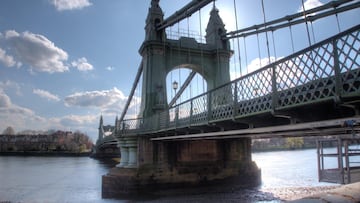Why the UK has foil-wrapped one of its most iconic bridges
The high temperatures recorded by the heatwave across England has caused the authorities to protect the structure of the Hammersmith Bridge.

The current heatwave has caused an unprecedented situation in the United Kingdom. It is the first time that the country has seen temperatures above 40ºC (104ºF), and that has seen the government declare a state of emergency with a threat to life.
England heatwave sees unforeseen bridge care needed
One of the actions carried out by the British authorities has been to protect the structure of its bridges with aluminum foil. In this particular case, an image of one of the most iconic bridges in London was shared on Tuesday morning.
In other news:
The 123-year-old Hammersmith Bridge was covered by the protective material to prevent damage to the bridge’s structure. In addition, they have established a refrigeration system that works at night.
However, it is not the only compelling reason to place these aluminum sheets. As explained in the Evening Standard, the bridge that crosses the Thames in the west of London has four pedestal chains. These must remain at a maximum temperature of about 13ºC in order to avoid structural damage. In the event that this temperature is exceeded, the authorities proceed to close the bridge to avoid a potential disaster.
The report also states that the authorities have invested 140 million pounds (around $160 million), for bridge repair work. In fact, it is not the first time that the structure of the bridge has been compromised by the high temperatures in the country. In 2020, the local authorities were forced to close the bridge.
The runway of the largest air base in the country, melted by the heat
Hammersmith Bridge is also not the only infrastructure affected by excessive heat in the UK. The Royal Air Force reported the suspension of incoming and outgoing flights, as well as the use of alternative aerodromes due to the fact that the runway of the largest air base, Brize Norton, melted as consequence of the temperatures recorded in Oxfordshire.
There were also delays on the rail line connecting London to the south of England, where a kink in one of the tracks was detected near Vauxhall, in the London Borough of Lambeth. The metal temperature reached 48ºC although concerns are that this can be significantly higher and risks derailment.





